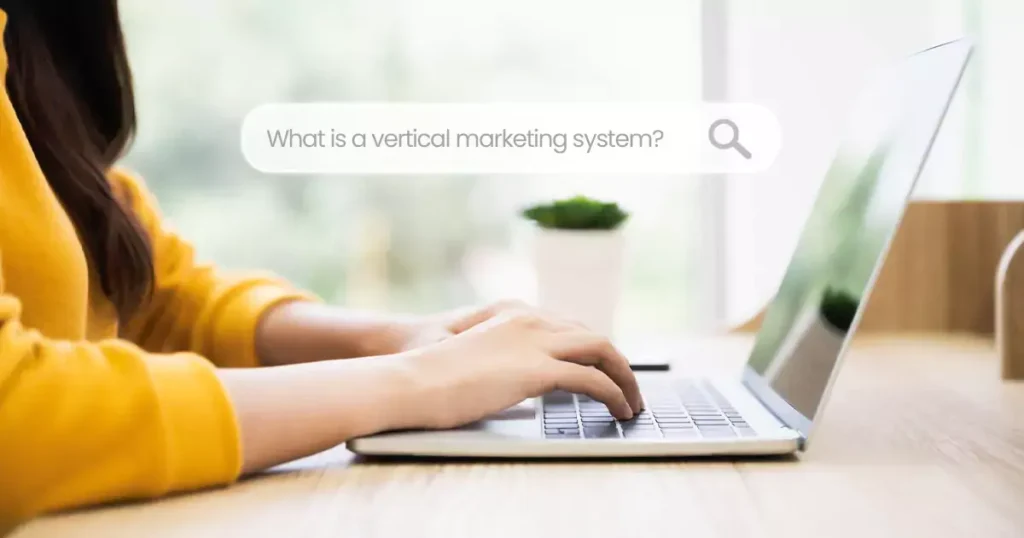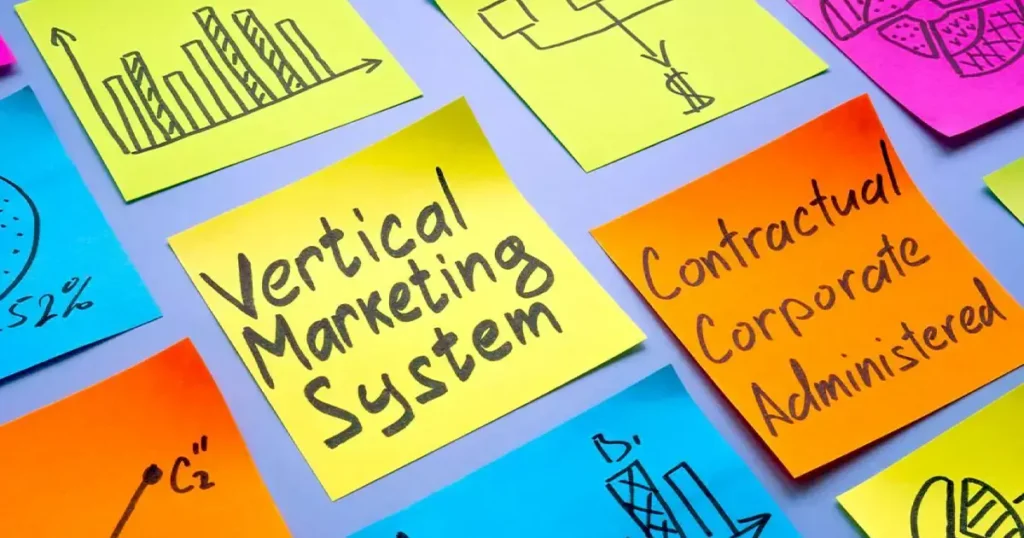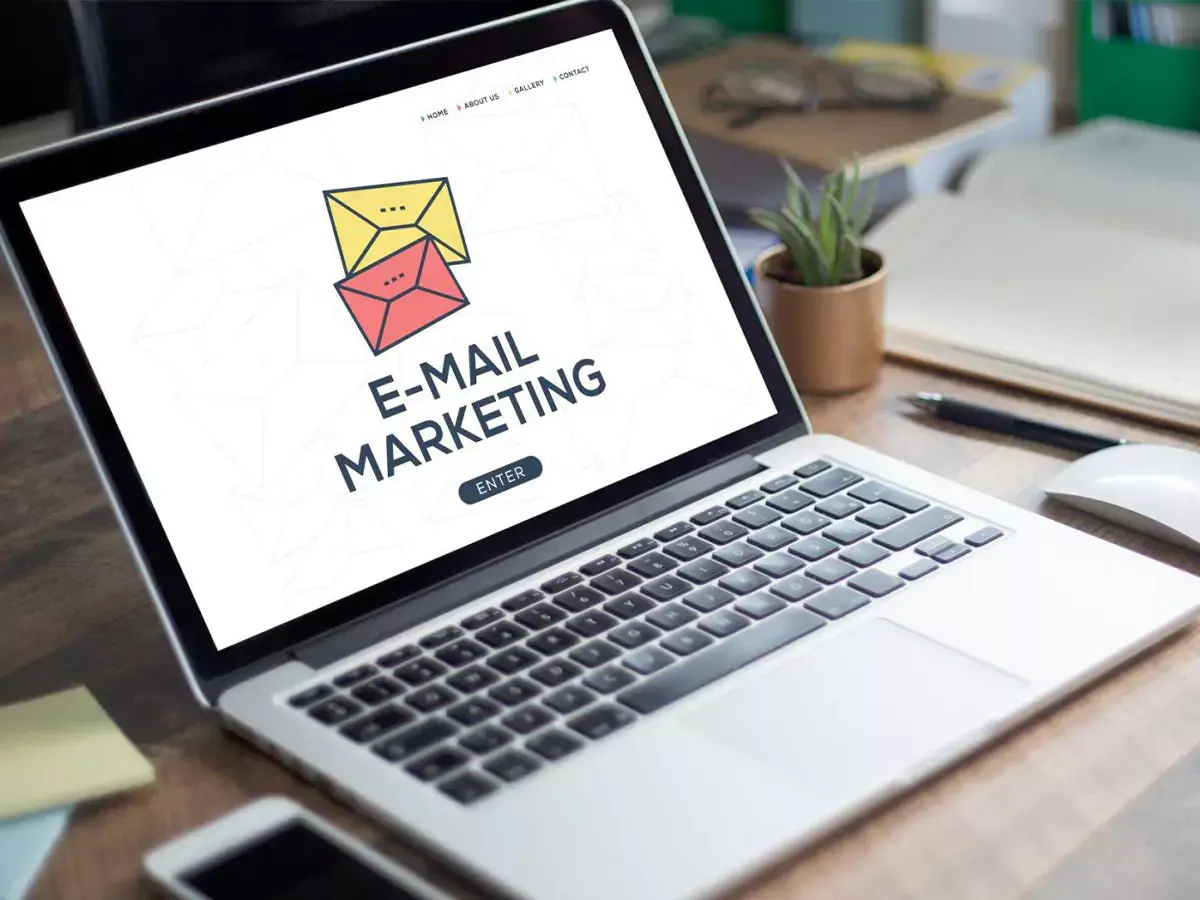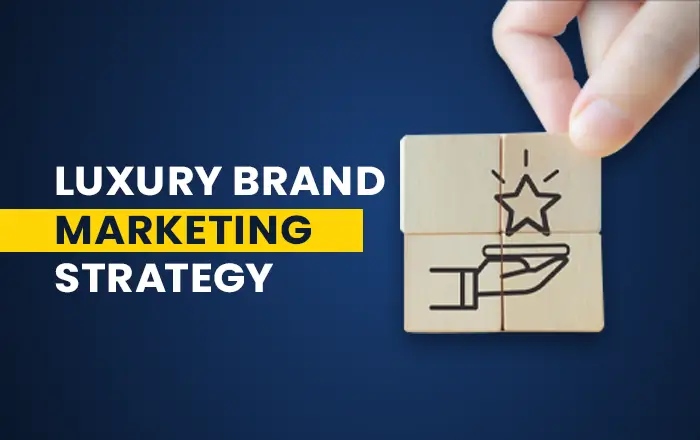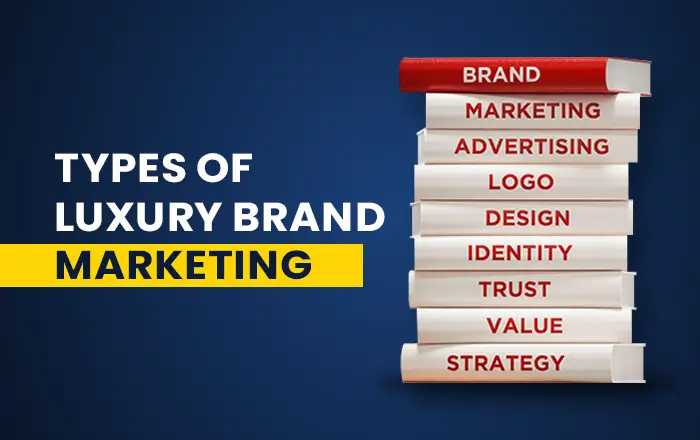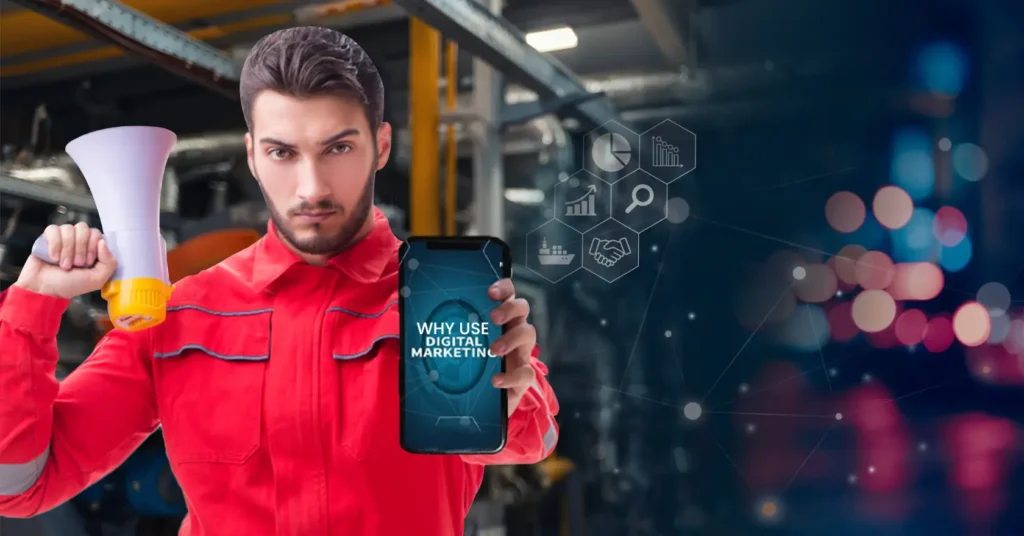Best SEO For E-Commerce
To thrive in e-commerce, where millions of businesses compete for consumer attention, one cannot underestimate the power of effective search engine optimization (SEO).
One phrase stands out when it comes to enhancing your online presence and driving organic traffic: “Best SEO for e-commerce.”
SEO empowers your online store to rise above the noise and connect with your potential customers precisely when they seek your products or services.
According to the research, Google’s organic search results generate 43% of all e-commerce traffic.
It’s not just about ranking higher in search engine results; it’s about creating a seamless user experience, delivering valuable content, and optimizing your online storefront to meet the unique demands of e-commerce.
In this article, we’ll explore why selecting the best SEO strategy for your e-commerce business is not just advisable but necessary for long-term success in the digital marketplace.
Let’s find out about SEO for E-commerce!
What is E-commerce SEO?
E-commerce SEO, or Search Engine Optimization, is optimizing online retail websites to improve their visibility in search engine results pages (SERPs).
It involves a series of strategies and techniques to enhance a website’s organic search ranking, thereby driving more organic (non-paid) traffic and potential customers to the online store.
Moreover, e-commerce SEO focuses on various elements, such as keyword research, on-page optimization, technical SEO, content marketing, and link building, tailored specifically to the needs of e-commerce platforms.
The ultimate goal of e-commerce SEO is to increase a website’s visibility and ranking for relevant product or category-specific keywords, resulting in more targeted traffic, higher conversions, and increased online sales.
Additionally, by fine-tuning the website for search engines, e-commerce businesses can gain a competitive edge in the highly competitive online marketplace.

E-Commerce SEO Checklist: Best Practices For Your E-commerce SEO Strategy Image
Creating a comprehensive e-commerce SEO checklist is crucial for online businesses looking to maximize their digital visibility and boost sales.
Below, we’ll explore the critical elements of an effective e-commerce SEO checklist:
- Keyword Research
Conduct thorough keyword research to identify relevant and high-value keywords related to your products. Use tools like Google Keyword Planner, SEMrush, or Ahrefs to find keywords with a good search volume and competition balance.
- On-Page SEO
Optimize your website’s product pages, category pages, and other key pages. Use the target keywords in the page title, meta description, header tags (H1, H2, H3), and throughout the content.
Moreover, ensure your product descriptions are unique, informative, and user-friendly. Implement schema markup to provide search engines with structured data about your products.
- Technical SEO For E-commerce
Make sure your website is mobile-responsive, as Google prioritizes mobile-friendly sites. Improve page load speed to enhance the user experience and satisfy search engine requirements.
Further, implement SSL for a secure browsing experience. Create an XML sitemap and submit it to search engines like Google. Ensure proper URL structure that is clean and contains relevant keywords.
- Content Creation
Develop high-quality, informative, engaging content such as blog posts, guides, and videos related to your products or industry.
In addition, regularly update your blog with fresh content to keep users engaged and encourage repeat visits. Promote user-generated content, such as reviews and testimonials, to build trust and credibility.
- Link Building
Build a strong backlink profile by earning high-quality, relevant inbound links from authoritative websites. Contact industry influencers, conduct guest blogging, and participate in content collaborations.
Additionally, avoid low-quality or spammy link-building practices, which can harm your site’s reputation.
- Social Media Integration
Leverage social media platforms to promote your products and engage with your audience. Share blog posts, product updates, and user-generated content on social media to increase your site’s visibility and traffic.
- User Experience & Navigation
Ensure an intuitive and user-friendly website design and navigation structure.
Optimize the product search functionality to make it easy for customers to find what they want.
Further, implement a clear and efficient checkout process to reduce cart abandonment.
- Monitoring & Analytics
Use tools like Google Analytics and Google Search Console to monitor website performance and track your SEO efforts.
Moreover, regularly review and analyze key metrics such as organic traffic, conversion rates, and keyword rankings.
- Local SEO (if applicable)
For businesses with physical locations, optimize for local SEO by creating and verifying Google My Business profiles and managing customer reviews.
- Ongoing SEO Maintenance
SEO is an ongoing process. Regularly update and refresh your content, monitor keyword rankings, and adapt your strategy based on changes in search engine algorithms and customer behaviours.
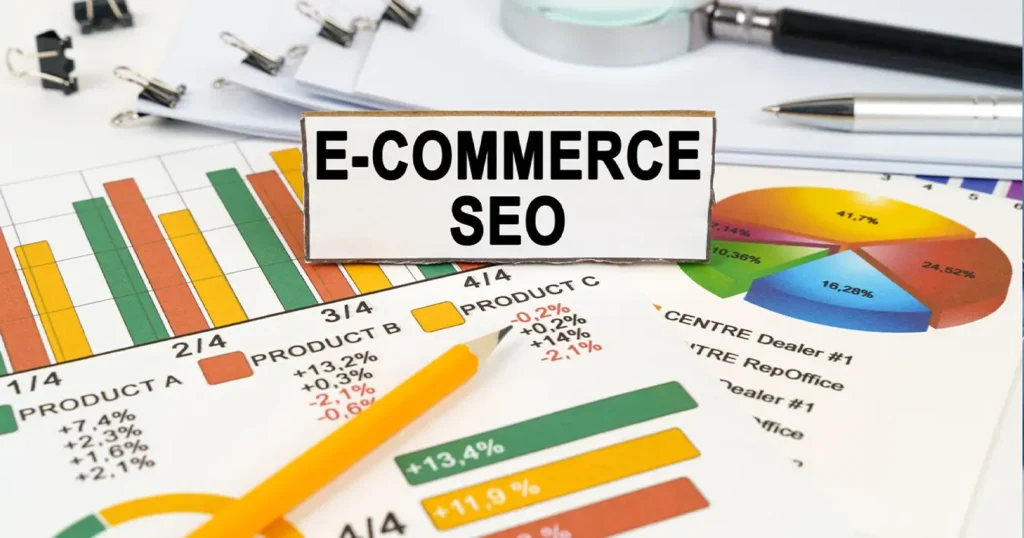
Importance of SEO in E-commerce
Search Engine Optimization (SEO) plays a crucial role in the success of e-commerce businesses.
SEO is not just a helpful tool but also a crucial requirement for those who want to succeed in the increasingly competitive online market.
Here are some reasons why SEO is so crucial in the e-commerce industry:
- Visibility & Traffic
E-commerce websites thrive on web traffic. E-commerce SEO services ensure that your online store ranks higher in search engine results pages (SERPs), making it more visible to potential customers.
The higher your ranking, the more likely users are to click on your website, increasing organic traffic.
- Credibility & Trust
Users often perceive websites that appear at the top of search results as more trustworthy and credible. Effective SEO techniques help build trust with your audience, such as optimizing for keywords, creating high-quality content, and improving user experience.
- Targeted Traffic
SEO for e-commerce product pages allows you to target specific keywords and phrases related to your products or services. It means that the traffic you attract is more likely to convert into paying customers, as it consists of people actively searching for what you offer.
- Cost-Effectiveness
Compared to paid advertising methods like PPC (Pay-Per-Click) campaigns, SEO can be more cost-effective in the long run. Once you’ve established a strong SEO foundation, it brings in organic traffic without incurring ongoing advertising costs.
- Mobile Optimization
With the increasing use of mobile devices for online shopping, mobile SEO is crucial. E-commerce sites optimized for mobile devices tend to rank better in mobile search results, ensuring you don’t miss out on many potential customers.
- User Experience
User experience is a critical factor in SEO rankings. Search engines like Google consider factors like website speed, navigation, and mobile-friendliness when determining rankings. A well-optimized site not only ranks better but also provides a better experience for users.
- Competitive Advantage
The e-commerce landscape is fiercely competitive. A strong SEO for an e-commerce business can give you a competitive edge by helping you stand out from the crowd, especially if your competitors are not as SEO-savvy.
- Long-term Growth
A well-executed SEO for e-commerce stores can provide sustainable, long-term results. While it may take time to see significant improvements, your efforts in SEO can continue to pay off for years to come.
- Adaptation to Algorithm Changes
Search engines like Google frequently update their algorithms. SEO professionals are skilled at staying current with these changes and adapting strategies accordingly. This adaptability is essential for maintaining and improving your online visibility.
- Analytics & Data Insights
SEO for e-commerce websites provides valuable data and insights about customers’ behaviour and preferences. This data can help refine your e-commerce strategy and make informed decisions to enhance your product offerings and marketing efforts.
- Global Reach
SEO can help e-commerce businesses reach a global audience. With effective SEO for e-commerce sites, you can target international markets and expand your customer base beyond your local or regional boundaries.

Skyrocket Your Sales With Digital ByteTeck’s Proven SEO Strategies!
Are you tired of watching your competitors dominate the e-commerce game?
Don’t worry; we’ve got your back!
At Digital ByteTeck, we’ve cracked the code to achieve the best SEO for e-commerce, and we’re ready to share our secrets with you.
Our team of SEO specialists knows e-commerce inside and out. We’re on top of the latest trends and algorithms to help you reach the top of search engine results.
Don’t let your business fall behind. Contact us today to take the first step towards e-commerce success!
Takeaway
In conclusion, a complete and comprehensive plan is the key to getting the best SEO for e-commerce.
The quickly changing digital landscape requires an in-depth plan that includes technical SEO, content optimization, user experience enhancements, and a strict dedication to staying at the forefront of industry best practices.
So, if you’re committed to beating your e-commerce competitors and maximizing your online potential, the conclusion is clear: embrace a well-structured, results-driven SEO strategy.
To do SEO for an e-commerce website, optimize product descriptions, use relevant keywords, improve site speed, create high-quality content, and build quality backlinks.
Yes, SEO is worth it for e-commerce as it helps increase organic traffic, improve visibility, and boost sales in the long run.
SEO affects e-commerce by driving organic traffic, improving search rankings, increasing conversions, and enhancing the overall online presence.
SEO in Shopify involves optimizing your online store for search engines by customizing meta tags, improving site speed, and using SEO apps to enhance visibility.
The cost of SEO per month can vary widely. Still, it typically ranges from a few hundred dollars to several thousand dollars, depending on the scope and complexity of your project.
SEO is still worth it in 2023, as it remains a fundamental strategy for increasing online visibility, attracting organic traffic, and growing a sustainable online presence.













